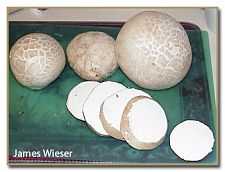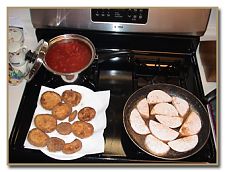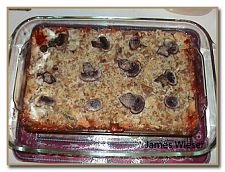Calvatia boonianaWestern Giant Puffball (in the east, look for Calvatia gigantea - it is smooth) Order Agaricales, family Agaricaceae
Base: sits on soil, small rootlike attachmentInterior: white and solid when young, becoming yellow-brown then dark olive brown and powdery. SPORES: OLIVE-BROWN HABITAT: ON GROUND EDIBILITY: edible when young and white inside Lookalikes:
But if you tried to kick it, it would 1) shatter, if young, 2) splat, if middle aged or 3) create a cloud of dust, if old and dry. At the young stage, when they’re pure white and firm inside, you can eat the Giant Puffball. But if the interior has started to turn yellow and is mushy, it’s reached the “splat” stage and shouldn’t be eaten. When it’s old and dry it will stream out clouds of spores. An average-sized puffball has about 7,000,000,000,000 (7 trillion) spores. So we calculate that the Giant Puffball, dinosaur variety, has about 21 to 35 trillion spores. So that’s one hell of a puff you get from this puffball! At the edible state, one way to fix it is to cut it into slabs, coat in beaten egg, and dredge in bread crumbs such as Panko. Saute in olive oil and/or butter. You can also try stacking the slabs like lasagna and adding your favorite tomato sauce.
Commentblog comments powered by Disqus |
 |
 FRUITING BODY: HUGE WHITE FLATTENED SPHERE WITH LARGE FLAT SCALES
FRUITING BODY: HUGE WHITE FLATTENED SPHERE WITH LARGE FLAT SCALES YOU MIGHT ALSO LIKE TO KNOW...
YOU MIGHT ALSO LIKE TO KNOW...

